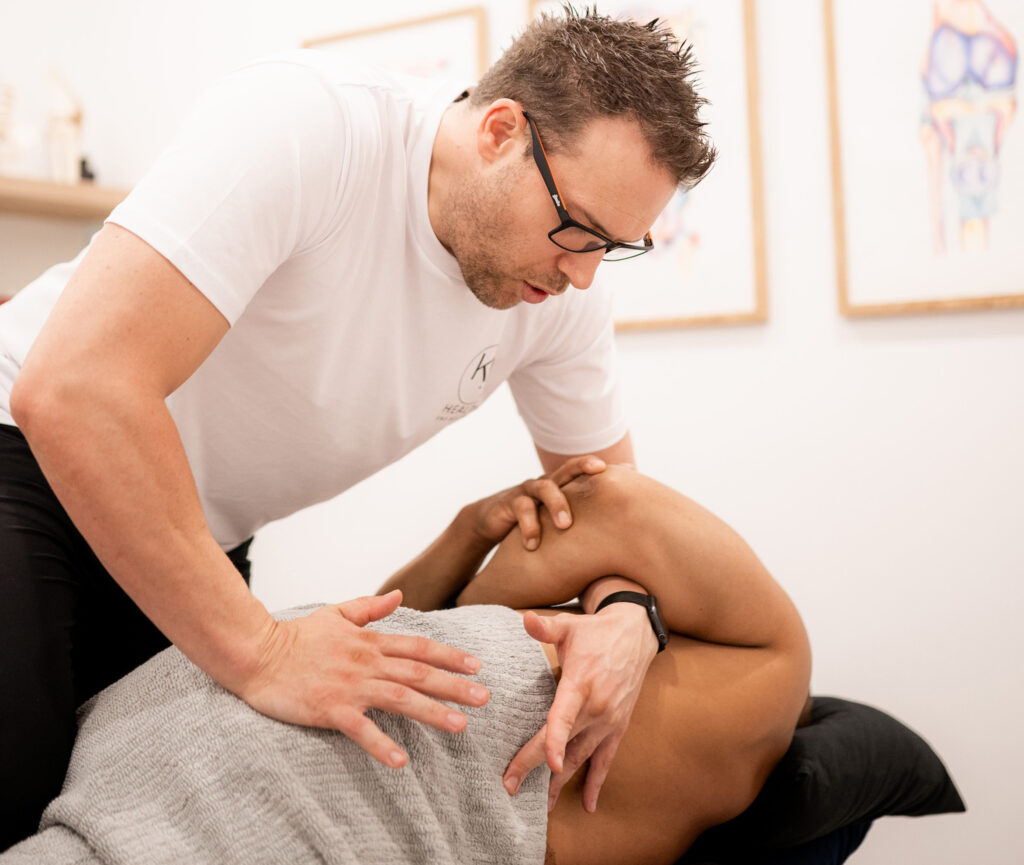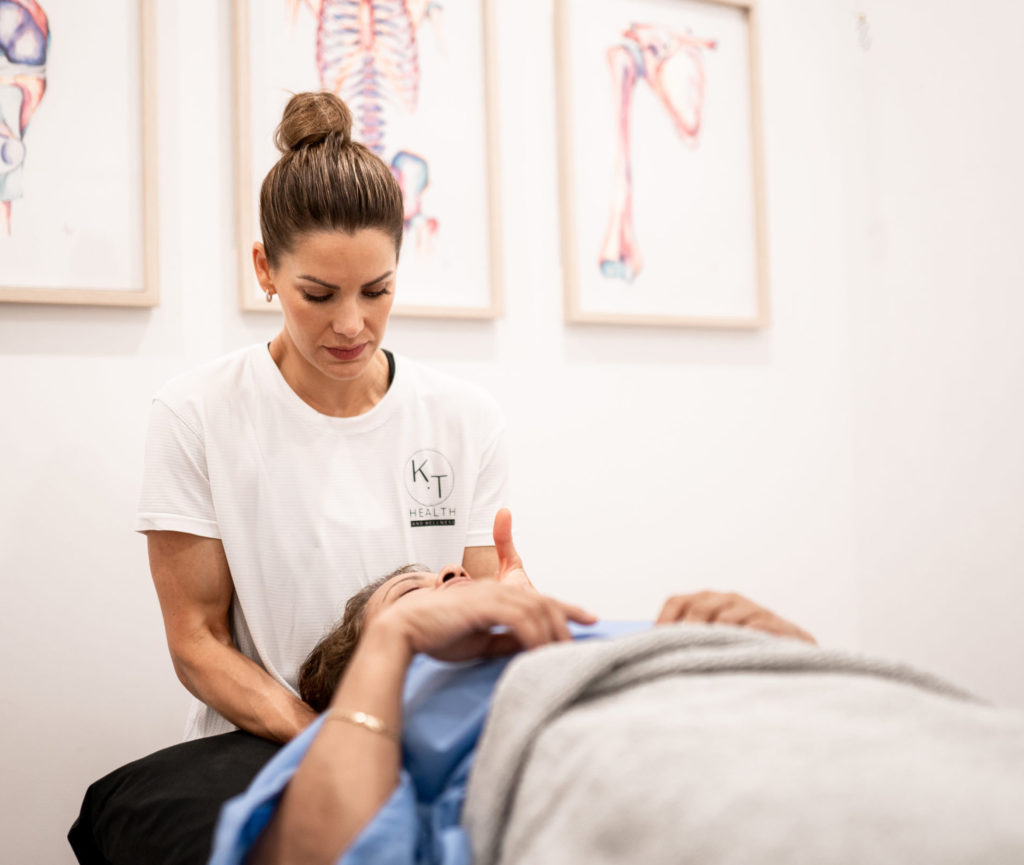Everything You Need to Know About a Pectoral Strain
What is a Pectoral Strain?
A pectoral strain is a tear or overstretching of the pectoralis major or minor muscles, located at the front of the chest. The pectoralis major is the large, fan-shaped muscle responsible for movements like pushing, lifting, and pulling the arms toward the body. A strain occurs when this muscle or its tendon is overloaded or overstretched, leading to pain, weakness, and sometimes bruising or swelling in the chest or front of the shoulder.
An analogy…
Think of the pec muscle like a thick elastic band across your chest. If you stretch it too far or too suddenly, especially under load, it can snap or fray, just like what happens during a strain.
What are other names that a pectoral strain can be referred to?
Torn Pectoral, Pec Strain, Pectoral Muscle Strain, Strained Pectoral, Pectoral Tear
What causes a pectoral strain?
A pectoral strain typically happens when the muscle is placed under high load in a lengthened position, especially during exercises like bench press, dips, or chest flys. The most common cause is excessive force during the eccentric (lowering) phase of pressing movements, where the muscle is trying to control a stretch. Strains can range from mild micro-tears to complete ruptures, especially where the muscle connects to the upper arm bone (humerus).
What are the signs and symptoms of a pectoral strain?
- Sudden sharp or pulling pain in the chest, armpit, or front of the shoulder
- Swelling or visible bruising in the chest or upper arm
- Weakness or pain during pushing movements
- Limited range of motion, especially when extending or rotating the arm outward
- A palpable gap or divot in the muscle
- Muscle tenderness when pressing or stretching the area
What tests are used to diagnose a pectoral strain?
Physical examination: Palpation and strength testing to assess muscle pain, swelling, and function
Range of motion testing: May show discomfort or restriction with arm movement
Strength tests: Pushing and adduction may be weak or painful
How long does a pectoral strain take to heal?
Recovery depends on the severity of the strain. Mild strains may heal in 2–4 weeks, moderate tears can take 6–8 weeks, and severe or complete tears (especially involving the tendon) may require surgery, with rehab lasting 3–6 months or longer.
How does a pectoral strain happen?
- Heavy lifting
- Poor technique or lack of warm-up
- Muscle imbalances between chest and back muscles
- Fatigue or overtraining
- Explosive or uncontrolled movements
What treatment can help a pectoral strain?
- Ice in the first 48–72 hours to reduce swelling
- Soft tissue therapy to manage muscle tightness
- Gradual stretching and strengthening exercises
- Corrective technique and postural training
What exercises or stretches can I do for a pectoral strain?
- Pendulum or assisted shoulder movements
- Isometric chest presses
- Scapular control and posture exercises
- Band or cable internal rotation/adduction
- Progressive pressing movements
What products can help with a pectoral strain?
Wall press-up
Stand facing a wall, around one large stride away.
Place your hands on the wall around the same height as your shoulders but slightly wider.
Lean against the wall, keeping a straight line from your head to your feet.
Bend your elbows, bringing your chest and hips in towards the wall and pushing your elbows outwards.
Make sure your body stays straight.
Push through your hands to straighten your arms back out again.
Continue this movement.
Note: the further away your feet are from the wall, the harder the exercise will be.

Latissimus dorsi stretch wall
Stand sideways to a door frame and take one step away.
Hold the frame with your hand, keeping your elbow bent.
Move your outer arm over the top of your head in an arch.
Hold the frame further up, curving your body over.
You should feel a stretch up your outer side and in to your upper arm.
Hold this position.

Child pose
Get onto your hands and knees, and drop your buttocks back onto your heels.
Stretch your hands forwards, dropping your head between your shoulders towards the floor.
You will feel this stretch through your back and upper arms.

STOP GUESSING – START MOVING
See what other people have said about our osteopaths
Trustindex verifies that the original source of the review is Google. KT health has really helped my back and i have been able to get back into competitive sportTrustindex verifies that the original source of the review is Google. Absolutely amazing, I see Louie Nouh who always listens and caters to my needs. He is amazing at his job and always helps alleviate my pain. I highly recommend Louie.Trustindex verifies that the original source of the review is Google. Friendly, supportive staff. Such a lovely place to exercise! Highly recommend.Trustindex verifies that the original source of the review is Google. Amazing instructor, I am new to Pilates felt very comfortable & supported.Trustindex verifies that the original source of the review is Google. I have been suffering from shoulder and neck pain for months - I saw Dr Louie Nouh a couple of time. His treatment really relived the pain. I have full range of movement now. His knowledge on exercise is fantastic.Trustindex verifies that the original source of the review is Google. Absolutely love reformer at menai. Instructors are amazing. Love Michaela and love the small classes. Highly recommend!Trustindex verifies that the original source of the review is Google. The trainers are all amazing , they explain everthing step by step and help where needed . It is an amazing place to relax get to know other people have a laugh . I recommend for anyone .Trustindex verifies that the original source of the review is Google. Ever since I came here I’ve been looked after by Louie and my shoulder is already feeling much better. Highly Recommend these are good people.Trustindex verifies that the original source of the review is Google. SENSATIONAL Chiropractor in Menai! I attended my first appointment with Dr Louis Nouh at KT Health & Wellness who is an absolute genius even after one session with him. He explained everything he intended to address about my lower back condition, all in easy to understand, layman’s terms. He said he would call me the next day to follow and see how I was feeling after our session and guess what, he did! During our session, he made me feel relaxed and comfortable especially as it was my first chiropractic appointment EVER! For some reason, I am actually looking forward to my subsequent sessions with him next week. Don’t get me wrong, he did poke, prod and crack me as necessary but the results made it seem worth it.Trustindex verifies that the original source of the review is Google. I have been seeing Melinda now for a couple of months to help with bursitis in my hip. She is one of the best practitioners I’ve ever seen.. With the use of various tools and techniques she has helped me recover much quicker than I expected. Thanks Mel and see you tomorrow!
We don't offer magic fixes or cures, but a sustainable approach to back pain.
Our Osteopaths will offer you a road map to help you take control of your back pain and feel great again.
BOOK YOUR OSTEOPATH VISIT TODAY
Book a Time with Dr Luke Madden Below
Book a Time with Dr Melinda Madden Below
Already have an account?
Book as a guest
- Book an Appointment






